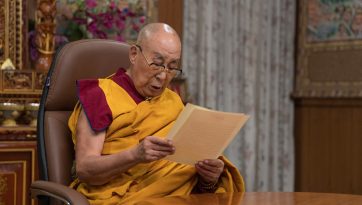His Holiness the Dalai Lama’s Address to the Members of European Parliament at Strasbourg, June 15, 1988
We are living today in a very interdependent world. One nation’s problems can no longer be solved by itself. Without a sense of universal responsibility our very survival is in danger. I have, therefore, always believed in the need for better understanding, closer cooperation and greater respect among the various nations of the world. The European Parliament is an inspiring example. Out of the chaos of war, those who were once enemies have, in a single generation, learned to co-exist and to cooperate. I am, therefore, particularly pleased and honoured to address this gathering at the European Parliament.
As you know, my country – Tibet – is undergoing a very difficult period. The Tibetans – particularly those who live under Chinese occupation yearn for freedom and justice and a self-determined future, so that they are able to fully preserve their unique identity and live in peace with their neighbours.
For over a thousand years we Tibetans have adhered to spiritual and environmental values in order to maintain the delicate balance of life across the high plateau on which we live. Inspired by the Buddha’s message on non-violence and compassion and protected by our mountains, we sought to respect every form of life and to abandon war as an instrument of national policy.
Our history, dating back more than two thousand years, has been one of independence. At no time, since the founding of our nation in 127 BC, have we Tibetans conceded our sovereignty to a foreign power. As with all nations, Tibet experienced periods in which our neighbors – Mongol, Manchu, Chinese, British and the Gorkhas of Nepal- sought to establish influence over us. These eras have been brief and the Tibetan people have never accepted them as constituting a loss of our national sovereignty. In fact, there have been occasions when Tibetan rulers conquered vast areas of China and other neighboring states. This, however, does not mean that we Tibetans can lay claim to these territories.
In 1949 the People’s Republic of China forcibly invaded Tibet. Since that time, Tibet has endured the darkest period in its history. More than a million of our people have died as a result of the occupation. Thousands of monasteries were reduced to ruins. A generation has grown up deprived of education, economic opportunity and a sense of its own national character. Though the current Chinese leadership has implemented certain reforms, it is also promoting a massive population transfer onto the Tibetan plateau. This policy has already reduced the six million Tibetans to a minority. Speaking for all Tibetans, I must sadly inform you, our tragedy continues.
I have always urged my people not to resort to violence in their efforts to redress their suffering. Yet I believe all people have the moral right to peacefully protest injustice. Unfortunately, the demonstrations in Tibet have been violently suppressed by the Chinese police and military. I will continue to counsel for non-violence, but unless China forsakes the brutal methods it employs, Tibetans cannot be responsible for a further deterioration in the situation.
Every Tibetan hopes and prays for the full restoration of our nation’s independence. Thousands of our people have sacrificed their lives and our whole nation has suffered in this struggle. Even in recent months, Tibetans have bravely sacrificed their lives to achieve this precious goal. On the other hand, the Chinese totally fail to recognize the Tibetan people’s aspirations and continue to pursue a policy of brutal suppression.
I have thought for a long time on how to achieve a realistic solution to my nation’s plight. My Cabinet and I solicited the opinions of many friends and concerned persons. As a result, on September 21, 1987, at the Congressional Human Rights Caucus in Washington, DC, I announced a Five-Point Peace Plan for Tibet. In it I called for the conversion of Tibet into a zone of peace, a sanctuary in which humanity and nature can live together in harmony. I also called for respect for human rights and democratic ideals, environmental protection and a halt to the Chinese population transfer into Tibet.
The fifth point of the Peace Plan called for earnest negotiations between the Tibetans and the Chinese. We have, therefore, taken the initiative to formulate some thoughts which, we hope, may serve as a basis for resolving the issue of Tibet. I would like to take this opportunity to inform the distinguished gathering here of the main points of our thinking.
The whole of Tibet known as Cholka-Sum (U-Tsang, Kham and Amdo) should become a self-governing democratic political entity founded on law by agreement of the people for the common good and the protection of themselves and their environment, in association with the People’s Republic of China.
The Government of the People’s Republic of China could remain responsible for Tibet’s foreign policy. The Government of Tibet should, however, develop and maintain relations, through its own Foreign Affairs Bureau, in the fields of religion, commerce, education, culture, tourism, science, sports and other non-political activities. Tibet should join international organizations concerned with such activities.
The Government of Tibet should be founded on a constitution of basic law. The basic law should provide for a democratic system of government entrusted with the task of ensuring economic equality, social justice and protection of the environment. This means that the Government of Tibet will have the right to decide on all affairs relating to Tibet and the Tibetans.
As individual freedom is the real source and potential of any society’s development, the Government of Tibet would seek to ensure this freedom by full adherence to the Universal Declaration of Human Rights, including the rights to speech, assembly, and religion. Because religion constitutes the source of Tibet’s national identity, and spiritual values lie at the very heart of Tibet’s rich culture, it would be the special duty of the Government of Tibet to safeguard and develop its practice.
The Government should be comprised of a popularly elected Chief Executive, a bi-cameral legislative branch, and an independent judicial system. Its seat should be in Lhasa.
The social and economic system of Tibet should be determined in accordance with the wishes of the Tibetan people, bearing in mind especially the need to raise the standard of living of the entire population.
The Government of Tibet would pass strict laws to protect wildlife and plant life. The exploitation of natural resources would be carefully regulated. The manufacture, testing and stockpiling of nuclear weapons and other armaments must be prohibited, as well as the use of nuclear power and other technologies which produce hazardous waste. It would be the Government of Tibet’s goal to transform Tibet into our planet’s largest natural preserve.
A regional peace conference should be called to ensure that Tibet becomes a genuine sanctuary of peace through demilitarization. Until such a peace conference can be convened and demilitarization and neutralization achieved, China could have the right to maintain a restricted number of military installations in Tibet. These must be solely for defense purposes.
In order to create an atmosphere of trust conducive to fruitful negotiations, the Chinese Government should cease its human rights violations in Tibet and abandon its policy of transferring Chinese to Tibet.
These are the thoughts we have in mind. I am aware that many Tibetans will be disappointed by the moderate stand they represent. Undoubtedly, there will be much discussion in the coming months within our own community, both in Tibet and in exile. This, however, is an essential and invaluable part of any process of change. I believe these thoughts represent the most realistic means by which to re-establish Tibet’s separate identity and restore the fundamental rights of the Tibetan people while accommodating China’s own interests. I would like to emphasize, however, that whatever the outcome of the negotiations with the Chinese may be, the Tibetan people themselves must be the ultimate deciding authority. Therefore, any proposal will contain a comprehensive procedural plan to ascertain the wishes of the Tibetan people in a nationwide referendum.
I would like to take this opportunity to state that I do not wish to take any active part in the Government of Tibet. Nevertheless, I will continue to work as much as I can for the well-being and happiness of the Tibetan people as long as it is necessary.
We are ready to present a proposal to the Government of the People’s Republic of China based on the thoughts I have presented. A negotiating team representing the Tibetan Government has been selected. We are prepared to meet with the Chinese to discuss details of such a proposal aimed at achieving an equitable solution.
We are encouraged by the keen interest being shown in our situation by a growing number of governments and political leaders, including former President Jimmy Carter of the United States. We are also encouraged by the recent changes in China which have brought about a new group of leadership, more pragmatic and liberal.
We urge the Chinese Government and leadership to give serious and substantive consideration to the ideas I have described. Only dialogue and a willingness to look with honesty and clarity at the reality of Tibet can lead to a viable solution. We wish to conduct discussions with the Chinese Government bearing in mind the larger interests of humanity. Our proposal will therefore be made in a spirit of conciliation and we hope that the Chinese will respond accordingly.
My country’s unique history and profound spiritual heritage render it ideally suited for fulfilling the role of a sanctuary of peace at the heart of Asia. Its historic status as a neutral buffer state, contributing to the stability of the entire continent, can be restored. Peace and security for Asia as well as for the world at large can be enhanced. In the future, Tibet need no longer be an occupied land, oppressed by force, unproductive and scarred by suffering. It can become a free haven where humanity and nature live in harmonious balance; a creative model for the resolution of tensions afflicting many areas throughout the world.
The Chinese leadership needs to realize that colonial rule over occupied territories is today anachronistic. A genuine union or association can only come about voluntarily, when there is satisfactory benefit to all the parties concerned. The European Community is a clear example of this. On the other hand, even one country or community can break into two or more entities when there is a lack of trust or benefit, and when force is used as the principal means of rule.
I would like to end by making a special appeal to the honourable members of the European Parliament and through them to their respective constituencies to extend their support to our efforts. A resolution of the Tibetan problem within the framework that we propose will not only be for the mutual benefit of the Tibetan and Chinese people but will also contribute to regional and global peace and stability. I thank you for providing me the opportunity to share my thoughts with you.




